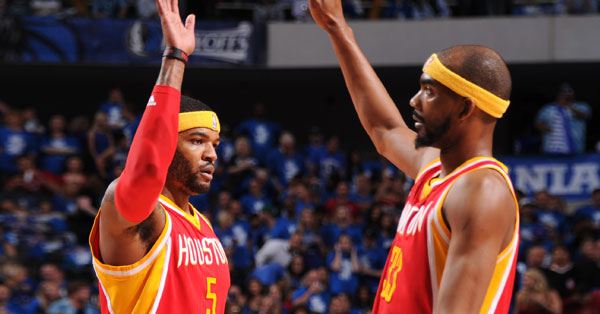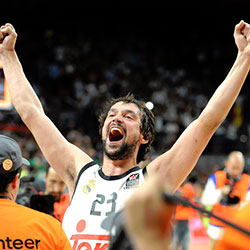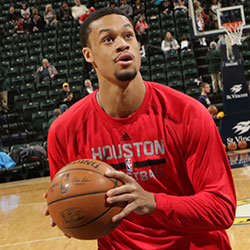Houston Rockets
Houston Rockets Salary Cap Update: 2015 Offseason Pre-Draft Edition
After the Houston Rockets’ best season in nearly 20 years, David Weiner breaks down their cap situation to keep their own free agents and improve the team.
Published
10 years agoon
The Houston Rockets just completed their most successful season in 18 years, advancing to the Western Conference Finals despite numerous injuries to key players throughout the season (including injuries to Patrick Beverley and Donatas Motiejunas that kept them out for the entire playoff run).
While many fans still have a bad taste in their mouths from a 4-1 series loss to the Golden State Warriors, the vast majority still seem to have (what I believe to be) the proper perspective on the overall success of this season’s campaign.
With the Rockets’ season now ended, it’s time to once again take a look at the team’s salary cap situation and where the Rockets can go from here.
Player Salary, Exceptions and Available Cap Room
(Salaries and contract information courtesy of ShamSports.com and some good old-fashioned digging.)
The Houston Rockets currently have the following player salary commitments, cap holds and salary cap exceptions available for the 2015-16 season:
Player salary commitments: Dwight Howard ($22.36 million), James Harden ($15.76 million), Trevor Ariza ($8.19 million), Kostas Papanikolaou ($4.8 million, non-guaranteed), Terrence Jones ($2.49 million), Motiejunas ($2.29 million), Pablo Prigioni ($1.73 million, partially guaranteed for only $440,000), Clint Capela ($1.24 million), Joey Dorsey ($1,015,421) and Nick Johnson ($845,059).
Cap holds: Jason Terry ($8.76 million – Rockets hold full Bird rights), Corey Brewer ($6.11 million – Rockets hold Early Bird rights), Beverley ($2.725 million – Rockets hold full Bird rights), Josh Smith ($2.49 million – Rockets have only Non-Bird rights), the rookie scale slot for the #18 pick in the 2015 NBA Draft ($1.37 million), and K.J. McDaniels ($1.05 million – Rockets have only Non-Bird rights).
Other Salary Cap Exceptions: Houston has some small trade exceptions from the Alexey Shved ($1.62 million), Isaiah Canaan ($816,482) and Troy Daniels ($816,482) trades. However, the key salary cap exception available to the Rockets this summer will be the Mid-Level Exception (MLE), either the Non-Taxpayer variety ($5.464 million, the use of which would impose a hard cap at the “apron” level – currently projected at $85.6 million) or the Taxpayer variety ($3.376 million). Houston will be unable to avail themselves of the Bi-Annual Exception ($2.139 million) this summer, as they used it this past season on Smith. (The Rockets could instead have the Room Exception of $2.814 million if they elect to use cap room this summer, but that is unlikely, as described below.)
Given these salary commitments and exceptions, and based on the currently projected 2015-16 salary cap of $67.1 million, the most cap room the Rockets could create (barring trades . . . yeah, I know) is about $10.37 million. However, this would involve renouncing rights to all free agents, waiving Papanikolaou and Prigioni and renouncing/trading away their first round pick. Since the Rockets are now at a level (title contention) where roster continuity is more important, do not expect them to opt for cap room . . . unless a star-caliber player shakes loose and opening up additional cap room is the only way to obtain that player. So the most likely scenario is that the Rockets will operate over the cap this summer.
So… What Happens Next?
As the Rockets prepare for the NBA Draft and the subsequent free agent season, there will be some internal cap-maneuvering for GM Daryl Morey and his staff to do.
The most likely such maneuver will be for the Rockets to pick up the $4.8 million team option on Papanikolaou’s contract. This option year is fully non-guaranteed, so there is no financial commitment attached to exercising the option. Also, exercising the option is necessary in order for Papanikolaou to be trade-eligible. As a sizable non-guaranteed contract, Papanikolaou will probably be a crucial component to almost any trade of significance the Rockets attempt to pull off this summer. I would be shocked if Kostas’s option were not picked up on or prior to draft day.
Houston will also likely extend qualifying offers to Beverley ($2.725 million, more than he’d otherwise receive based on his prior salary due to meeting the CBA’s “starter criteria”) and to McDaniels ($1.05 million, which is the one-year veteran’s minimum plus $200,000) in order to make them both restricted free agents and to give the Rockets the ability to match any offers from other teams.
Expect the Rockets to ramp up their years-long courtship of 2009 second round pick Sergio Llull, a 6-3 combo guard who has developed into one of the top guards in Europe. After helping lead Real Madrid to a EuroLeague title, there is little else Llull can accomplish overseas. While being a star on a perennial title contender in his home country (as well as a prohibitive contract buyout) has thus far kept Llull from making the leap to the NBA, he has reportedly always had interest in eventually coming over. With a title now in hand (and his buyout amount allegedly now low enough), now seems like the ideal time for the 27-year-old guard to join the Rockets. He will likely command most/all of the MLE, so the Rockets will need to prioritize such a signing with their other offseason moves. But hearing head coach Kevin McHale (in an interview with 790 AM’s Charlie Pallilo) recently, it sounds like signing Llull will be a high priority for this team.
Draft Day Maneuvering
The Rockets will enter the 2015 NBA Draft armed with the 18th and 32nd picks, about $800,000 in remaining cash to spend, as well as an assortment of young players, draft rights and future picks to trade. Knowing Morey, expect Houston to diligently seek out a draft night deal. Whether that is an attempt to trade up in the draft or a shot at acquiring an established point guard (such as Kyle Lowry or Ty Lawson) remains to be seen.
Unlike trades consummated after the July Moratorium, draft day trades (as in, those trades actually consummated before July 1) are made using this current season’s cap figures. With the Rockets only about $2-3 million below the luxury tax threshold this season, any large draft day trades they make will probably subject them to the “taxpayer matching rules” (in which a team that will be over the tax threshold following a trade may not take back more than 125% of outgoing salary plus $100,000). Therefore, we may see the Rockets agree to terms on a trade during the draft but not have it consummated until some time in July (when the cap figures reset, certain outgoing players’ salaries increase, and the team can possibly drop far enough below the tax threshold to work under more favorable salary matching rules).
The more likely scenario (as is always the case) is that the Rockets are unable to pull off a significant draft day trade. We may instead see Rockets owner Leslie Alexander once again allow Morey to spend his remaining $800,000 cash allotment this season on a late second round pick to stash overseas (as the team has done in recent years with Furkan Aldemir and Alessandro Gentile).
Free Agent Decisions
The Rockets have several key decisions to make regarding their own free agents that could greatly impact what they do about any outside additions to the roster. In his interview with Pallilo, McHale made it quite clear that retaining most/all of their free agents was a high priority for the Rockets.
Patrick Beverley: While Beverley’s relatively low cap hold could possibly help the Rockets make other maneuvers before re-signing him, don’t expect Beverley to be overly generous in his contract demands. Despite his injury history, expect his agent to cite (repeatedly) Beverley’s honor as an NBA All-Defense Second Teamer in 2013-14 and to look for a deal in the range of what Boston defensive guard Avery Bradley received last summer (4 years, $32 million). That might be a tad rich for Houston, especially if they hope to muster any meaningful cap room in the summer of 2016. However, if Beverley is willing to sign for less in order to retain a starting spot on a contender, there is still a decent chance that he’ll be back next season.
Corey Brewer: After waiving his player option as a condition to his trade to Houston last December (an option that he undoubtedly would not have exercised anyway based on his late season performance), Brewer will become an unrestricted free agent on July 1. The Rockets hold Early Bird rights to Brewer, which means that they can offer him a deal starting as high as about $8.23 million. As it is unlikely that Brewer will do better than that (or even get that high an offer from the Rockets), Houston should be able to exceed the cap in order to retain Brewer if the sides can agree on a deal. While Brewer’s high motor is a huge plus for this team, the Rockets will need to weigh his strengths against his weaknesses (poor 3-point shooting and a tendency to overplay too much on defense) when deciding how much to offer him.
Josh Smith: I wrote in my last cap update about the details surrounding Smith’s free agency and how much the Rockets could offer him. Essentially, Houston must either hope that Smith accepts its Non-Bird free agent tender ($2.49 million) or use the MLE (or cap room) to re-sign Smith. While Smith would still clear over $7 million in total salary next season between a Non-Bird tender from Houston and his stretch payment from the Detroit Pistons, he can always make more with a larger new contract. It seems the Rockets are hoping they can leverage Smith’s happiness in Houston to convince him to stay for the Non-Bird amount. Only time will tell if that strategy will work.
Jason Terry: Coming off an MLE-sized contract he signed with the Boston Celtics in 2012, do not expect Terry to re-sign for anything close to that much this summer. But the Rockets apparently love what Terry brings to the table, both on and off the court. As has been mentioned on this site, look for the Rockets to offer Terry a deal similar to what they gave Francisco Garcia a couple of years back: either a two-year veteran’s minimum deal (with a player option on Year 2) or a one-year vet minimum deal (perhaps with a tacit understanding about an ongoing role with the team).
K.J. McDaniels: The decision with McDaniels will likely be one of the hardest decisions of the offseason for Houston. A young player with high upside, there will certainly be several teams that come calling for McDaniels’s services. But the Rockets are limited to either their qualifying offer ($1.05 million) or tapping into the MLE (or cap room) to re-sign K.J. (As an “Arenas Rule” free agent, no team can offer McDaniels a starting salary in excess of the full Non-Taxpayer MLE; but teams could still create the sort of “poison pill” offer sheets Houston utilized to sign Jeremy Lin and Omer Asik.) The Rockets traded for McDaniels in February largely to reserve another palatable alternative for themselves this summer should Brewer leave or should Ariza be traded. But if Ariza and Brewer are both Rockets next season — and especially if Llull comes over as an MLE signing — it is likely that McDaniels moves on to another team. If the Rockets can somehow convince McDaniels to accept the qualifying offer (with the hopes of signing a larger contract next summer), it would be quite the coup for Morey and his staff.
Conclusion
After a terrific playoff run to the Western Conference Finals, the Rockets must now turn their attention to both retaining the talent that got them there as well as adding to that talent via trades and free agency. Morey and company have enough assets to at least make legitimate trade offers this summer for a “third best player” or other key piece. Even if no outside talent is added, bringing back this season’s entire (healthy) rotation, with the additions of Llull and a mid-first rounder, could possibly be enough to get Houston over the hump next season. But if we’ve learned anything from the last several years, it’s that the Houston Rockets will explore every possible avenue to get better.
You may like
Houston Rockets
Looking Back on the Trade for Phoenix’s Draft Picks
Are the Rockets set to cash in on Phoenix’s downfall or could a Suns retool murky the waters?
Published
4 weeks agoon
March 12, 2025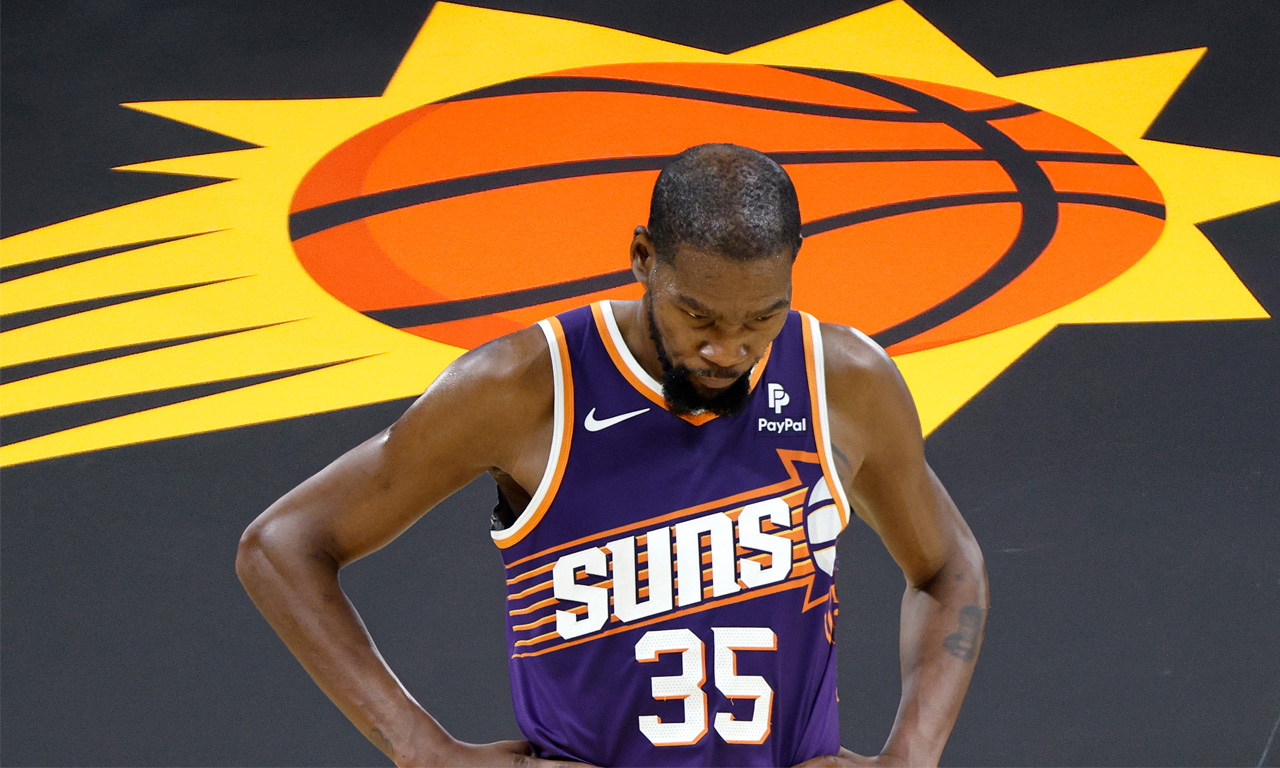
As the Houston Rockets set to host the Phoenix Suns tonight, it seems the right time to take a look back at the trade that linked these two franchises together for the foreseeable future.
This past June, the Rockets made a trade with Brooklyn that sent back to the Nets control of their 2025 and 2026 unprotected first-round picks. In exchange, the Rockets received a large chunk of Phoenix’s future (2025, 2027, 2029) and control of the Dallas Mavericks’ 2029 first.
In essence, the Rockets traded one pick and one swap for two picks and two swaps. All unprotected.
Thoughts At The Time of the Trade
If I’m going to discuss the current outlook of this trade, I have to be honest about how I saw it at the time of the move. While I didn’t hate this trade initially, I definitely didn’t love it either.
I liked that the Rockets increased their overall trade assets. I also liked that they extended the timeline to be able to make a bigger trade and I also appreciated that they kept control of the 2027 Brooklyn swap.
But I didn’t like that the Rockets gave up what seemed like the more established value (Brooklyn) for a more uncertain gamble (Phoenix). The Rockets did not control a “tanking runway” of picks to offer back to Phoenix — all of the picks Houston got in the deal were in staggered years (’25, ’27, ’29). I also felt Brooklyn, who badly needed to rebuild, got away with paying market value to get their picks back despite the fact that the Rockets invested years in watching those picks appreciate up to the point that they had the Nets completely over a barrel.
Net-net: I felt like more certainty was traded for less certainty and it was more of an equitable trade for both teams rather than Brooklyn paying dearly to get back the things only the Rockets could offer.
There were two ways I thought this trade could pay dividends: The Suns needed to flame out immediately, as in this season (unlikely), or the Rockets could trade all those pick assets as part of a deal for a real superstar in the next 12-18 months (more likely).
In a testament to how quickly change can occur in a very unpredictable NBA, four things have happened that have been positive indicators for the Rockets in making this move.
The Suns are fading
While Phoenix had major salary cap issues, dealing with the second apron, they didn’t appear to have problems on the court. They jumped out of the gate 8-1 and looked like a legitimate contender behind their star trio of scorers in Kevin Durant, Devin Booker and Bradley Beal.
Given Houston controlled Phoenix’s pick this year via a swap, it looked like the Rockets would come up empty-handed on the trade this season.
That changed quickly.
Injuries, serious depth concerns and a lack of a defensive identity has sent Phoenix spiraling. Booker’s availability has been inconsistent, forcing Durant to carry the load, while Beal has not quite fit in at all. Their financial limitations, thanks to owner Mat Ishbia’s all-in spending spree, have handcuffed their ability to improve the roster around the three stars.
The Suns are sitting 11th in the West, having gone 22-34 since that hot start, and are currently trying to catch a depleted Dallas squad to get back into the play-in picture.
As of right now, the Rockets project to end up with a lottery pick (albeit a late one) this season out of the trade.
Phoenix was caught shopping Durant
Because the Suns struggled so hard after the start, they tried to make a major move at the deadline but could not unload Beal, in large part due to his no-trade clause.
As a result, they may have made a misstep: They openly tried to trade Durant, which inevitably became public news.
Now? Durant will almost assuredly be traded this summer — likely to a destination that he handpicks. This means the Phoenix Suns will have to look at all possibilities for their future, including potentially having to give Rafael Stone and the Rockets front office a call.
But keep in mind, the Rockets can not offer Phoenix the ability to completely rebuild via the draft right now. Phoenix’s 2026 pick is controlled by Washington. They would have to get extremely creative to set that stage. A retool in Phoenix is much more likely.
Could Brooklyn have been better than expected?
This one is tougher to gauge.
The Brooklyn Nets are currently tied for fifth-worst team in the league, giving them strong lottery odds this summer. This was expected. After all, the Nets, even with a healthy Mikal Bridges and a full roster, were not a good team last season, closing the year 20-41 in the final three quarters of the season. The Rockets ended up with the #3 pick (Reed Sheppard) as a result of Brooklyn’s mediocrity.
However, if the Rockets had not placed that pick back in Brooklyn’s hands, would the Nets be better than this?
Brooklyn brought in a new coach in Jordi Fernandez that has had a positive impact. They have dumped off players, such as Dennis Schroeder and Dorian Finney-Smith, that impacted winning. The bar to make the play-in in the East (.415 winning percentage) is obscenely low, with Brooklyn being just five wins away from it at the moment.
And on top of that, Brooklyn did have lots of draft capital that they could have moved to try to win now.
It’s very tough to say as you don’t know if a team with Bridges still in Brooklyn might have actually been worse than this current squad, but you could make a case that the pick the Rockets would have ended up with from Brooklyn this season would be eerily similar to the one they will end up getting from Phoenix this year.
Again, this is a tough call.
Nico Harrison Hooked the Rockets Up
As part of the trade, the Rockets got control of the Dallas Mavericks’ 2029 first-round pick (unprotected, of course). While there’s really no way of knowing what a pick will be five years out, we did know that Luka Doncic would be just 29-30 years old that season and it was fairly etched in stone that he would be the core piece of a Dallas squad that season.
Enter chaos in Dallas.
Doncic was shipped out in the trade that shocked the world, which could have a major impact on the Rockets. Dallas’ current core of Kyrie Irving and Anthony Davis will be 37 and 36 years old that season, respectively.
On paper, the value of that pick shot up.
Final Summary
Right now, the outlook on these picks looks strong. One source stated off the record that they feel the 2029 Phoenix pick is the best pick asset out there that is owned by another team. The Rockets would be reluctant to add that one specifically into any trade unless it’s for a truly legitimate star.
But if there is any lesson that the NBA teaches us over and over again, it’s that it’s very hard to predict where a team will be a year from now, much less three years from now.
Can the Rockets pressure Phoenix and leverage the ownership they have of their draft capital to get what they really want (Booker) from them? Could a Suns retool around Booker and Beal, with the right pieces and assets acquired from a Durant trade, significantly change their on-court outlook and cap sheet — which in turn could damage the value of the picks Houston controls?
Bottom line is it has worked out well this season, and the future forecast at the moment is promising. The current value of those future picks appears strong. What will likely determine history’s final grade for this trade will be how it sets them up for the trade to come, and that’s where fans will be looking to Stone and the front office for action starting this summer.
Houston Rockets
Amen Thompson’s ankle injury will be re-evaluated in one week
“The things he does you can’t replicate,” says Rockets coach Ime Udoka
Published
1 month agoon
March 10, 2025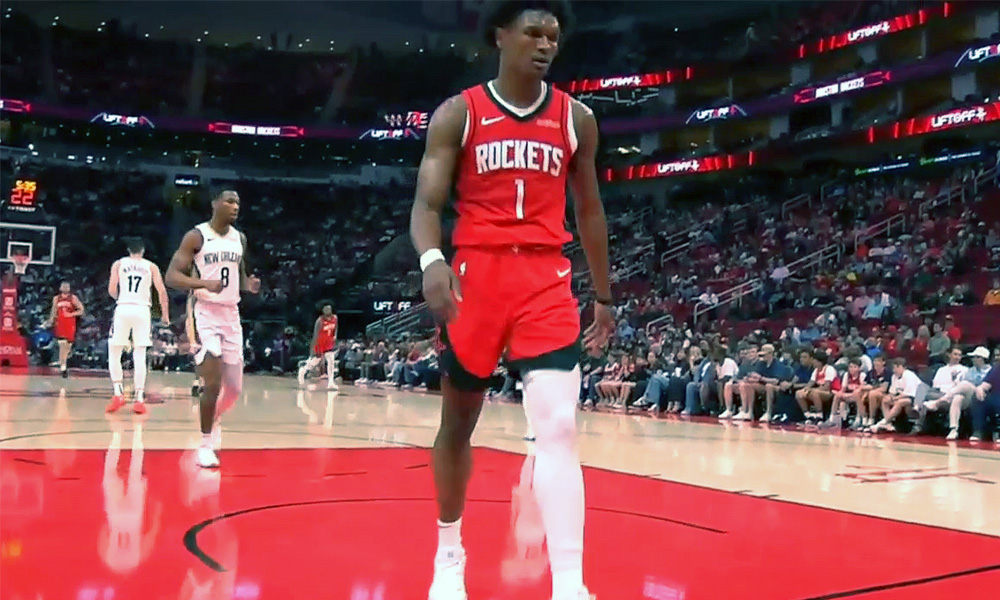
Rockets young star Amen Thompson will have his ankle injury re-evaluated in one week, according to Ime Udoka.
Thompson had an MRI on Sunday and the Rockets coach confirmed all imaging (X-ray, MRI) was negative.
“Just some swelling and pain, obviously,” said Udoka.
If you listen to Udoka, you can tell he knows how special Amen is to this team. He said the Rockets are missing a lot by not having him out there.
“Obviously, the things he does you can’t replicate,” said Udoka. “[Amen is] a guy that plays every position for us. When one goes down, he runs the point. If another is out, he runs the four.”
Amen is one of the best defensive players in the game, and as a one-on-one defender of guards/wings, he might already be the best in the league in just his second season. He’s holding his opponents to 40.5% shooting from the field, tops in the league.
“He’s a very unique defensive player,” said Udoka. “We got some guys that do some great things there, but I like to put him and Dillon on the best two usually, night to night. You got Tari and that’s a luxury as well, but the way he goes about it is different. His athleticism, size, speed, strength, shotblocking ability, steals… he’s all over the place.”
“Hard to replicate for sure.”
Amen injured his ankle late Saturday night in a blowout win against the Pelicans, but the unfortunate part was he probably should not have been on the floor in the first place.
The Rockets left Amen Thompson in the game in a blowout to get one more rebound for a triple-double and he just got injured. He's heading to the locker room with a limp. https://t.co/UBtrEpgWuU pic.twitter.com/D8GeKP8sQk
— ClutchFans (@clutchfans) March 9, 2025
The Rockets had built well over a 30-point lead by early fourth quarter. Jalen Green was able to rest the entire fourth. Alperen Sengun came out of the game with 7-8 minutes left while Dillon Brooks and Tari Eason came out with 6:00 left. But Thompson, who had posted an insane +39 on-off number, remained in the game because he was one rebound shy of a triple-double with 15 points, 11 assists and nine rebounds.
Udoka addressed that decision on Monday before the game against Orlando.
“What I typically don’t do is wholesale substitutions,” said Udoka of the decision to keep Amen in the game. “Albeit 30[-point lead] at six minutes [left] is different than losing to Minnesota, a 16-point lead with four minutes [left].”
“I’ve seen it go both ways in the past. You take out guys too early and have to bring starters back, and vice versa.”
Thompson has played in 60 games this season, five short of being eligible for postseason awards. He absolutely should be up for an All-Defensive nod this season so keep an eye on him getting back in time for that. He would need to return to action no later than April 4th for the game against the OKC Thunder in order to play enough games to be eligible.
Houston Rockets
How the Kyrie Irving Injury Impacts Rockets
Houston’s draft positioning and offseason plans could be impacted by Dallas
Published
1 month agoon
March 4, 2025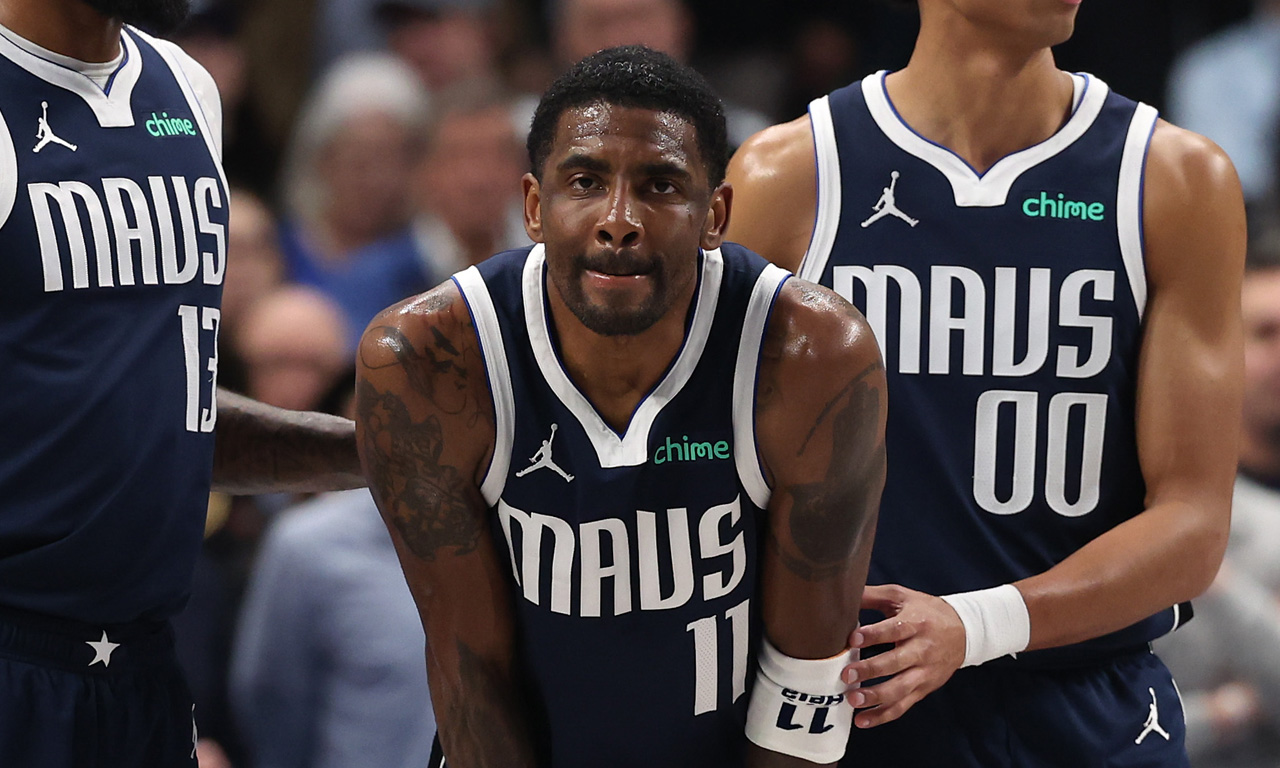
Dallas Mavericks guard Kyrie Irving was injured Monday night and the news dropped on Tuesday that the knee injury is serious — a torn ACL in his left knee that will end his season and a good portion of next season as well.
Brutal. I can’t think of an NBA team that imploded faster than the Dallas Mavericks.
You trade away a 25-year-old phenom who just hoisted you on his back en route to the NBA Finals a year ago. You cashed in that golden ticket to go all-in on a trio of aging stars in Kyrie, Anthony Davis, and Klay Thompson.
Bold strategy, Nico. Let’s see if it pays off.
(Narrator: It’s not paying off.)
The Mavericks had some interesting potential this year and maybe the next couple of years once everyone was healthy, but now? Their star guard is likely out until the calendar year 2026 and Klay and AD aren’t getting any younger nor more durable. The Mavericks may have actually swapped their future for a present that never arrives — and Dallas GM Nico Harrison has to be feeling overwhelming pressure right now.
So how does this impact the Rockets?
For starters, Houston has a game remaining on the schedule against Dallas on March 14th at Toyota Center — Davis may or may not be back for that game.
More importantly, Dallas is the 10th seed in the West at the moment, just 3.5 games ahead of the Phoenix Suns (11th seed). The Rockets control Phoenix’s first-round pick unprotected this season via a swap. We need as many West teams as possible ahead of Phoenix to keep them out of the play-in/playoffs and to push them as deep into the lotto as possible.
This complicates that. Phoenix’s remaining schedule is the toughest in the NBA by a good margin, with plenty of games left against the league’s best teams, so it still looks promising overall — but we’re talking about Kevin Durant, Devin Booker and Bradley Beal. They can still get hot at the right time while Dallas may struggle.
So keep a close eye on that. The good news is the Portland Trail Blazers are one of the hottest teams in the league and they are (shockingly) nipping at the Arizona squad’s heels.
Taking a look ahead to the offseason, the Kevin Durant Pursuit will be big.
This one is a little more complicated for Houston. The Rockets really want Devin Booker but, as of now, the Phoenix plan appears to be to trade KD this offseason and retool around Booker. The Rockets will have interest in Durant but they’re not going to sell the farm (prospects and all the picks) for a 37-year old like they would for Booker.
Three teams that I’ve heard a lot about from Rockets circles that will be in the mix are Houston, Minnesota and Dallas — Timberwolves and Mavericks have been considered the main competition. But, a lot of this will depend on Durant himself and where he wants to play at this stage of his career.
Keep in mind also, if the Suns are “retooling” around Booker and Beal (holding the no-trade clause), then they could be placing a higher priority on win-now players over the return of their own draft assets. The Rockets definitely have the best assets overall to offer up in any trade package between those three teams, but if Phoenix does prefer finding the right ready-to-win players around Booker/Beal, that gives Dallas and Minnesota a real chance.
This injury “may” take Dallas out of the equation, and they are/were definitely a contender for KD’s services given his past relationship with Kyrie and the way Dallas was positioned to win right now. Does KD at his age want to wait for Kyrie to be healthy?
And one last friendly reminder: The Rockets control that Dallas 2029 first (unprotected).
Houston Rockets
Rockets Sign David Roddy to Two-Way Contract
Former first-round pick has played with the Grizzlies, Suns and Hawks
Published
1 month agoon
March 3, 2025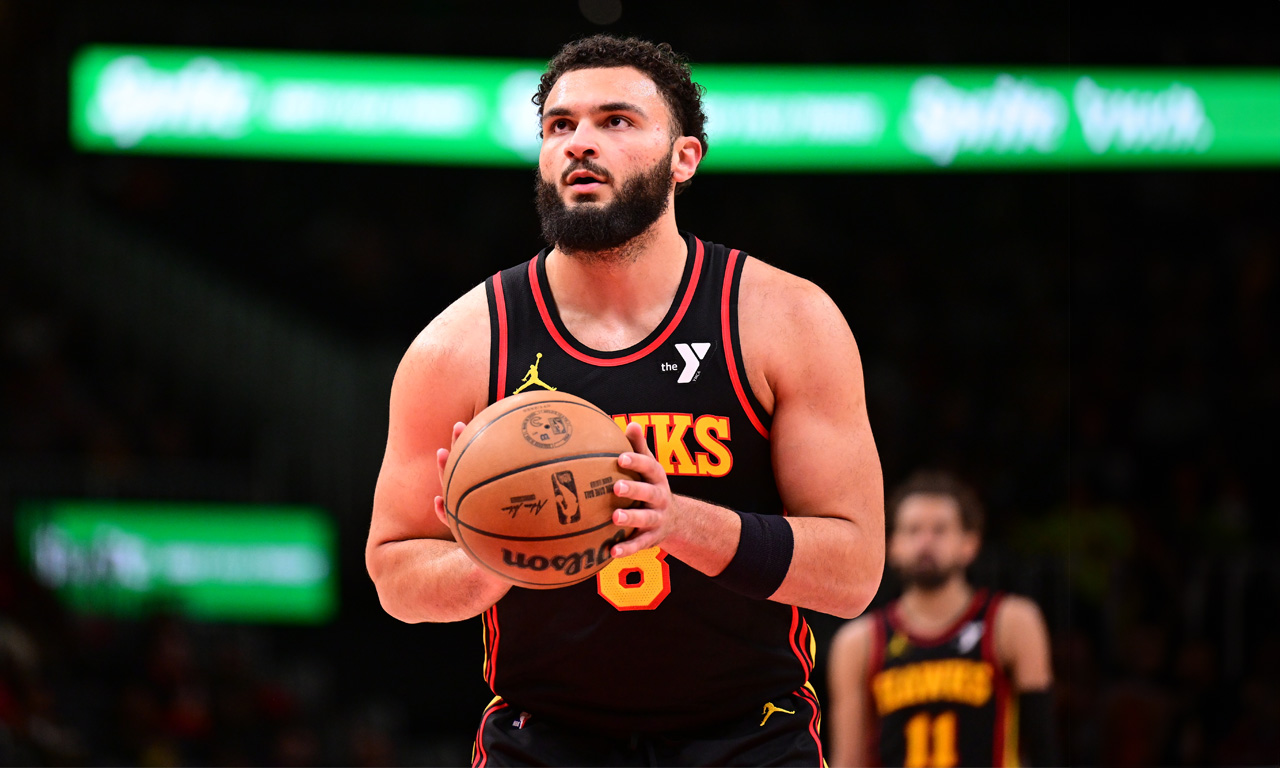
The Rockets made a move on Monday, signing former first-round pick David Roddy to a two-way contract.
The two-way spot opened up after the front office signed Jeenathan Williams to a standard four-year, $8.2 million contract (with friendly team options all along the way).
Roddy is 6-foot-5 and 250+ pounds but sports a 6-foot-11 wingspan. He was taken with the 23rd pick in the first round of the 2022 NBA Draft — six selections after the Rockets drafted Tari Eason. A standout in college, Roddy averaged 19.2 points, 7.5 rebounds, 2.9 assists, 1.2 steals, and 1.1 blocks per game during his junior season at Colorado State.
Roddy, who turns 24 later this month, is a physical player who can play multiple positions. He’s a solid rebounder for his size/position. He has played in 165 games over three seasons with the Grizzlies, Suns, Hawks and most recently Sixers, averaging 6.2 points and 2.9 rebounds per game.
The guard/forward has not shown efficient shooting, however — he’s a career 30.5% three-point shooter and just 68.4% from the line. His defense is better inside than out.
Ultimately, it will be those two things — three-point shooting and defense — that will determine his chances of carving out a consistent role in the league.
All in all, it’s a low-risk signing and the Rockets get a look at a prospect that fits their age timeline.
Houston Rockets
Houston a potential landing spot for Ben Simmons post-buyout?
Published
2 months agoon
February 6, 2025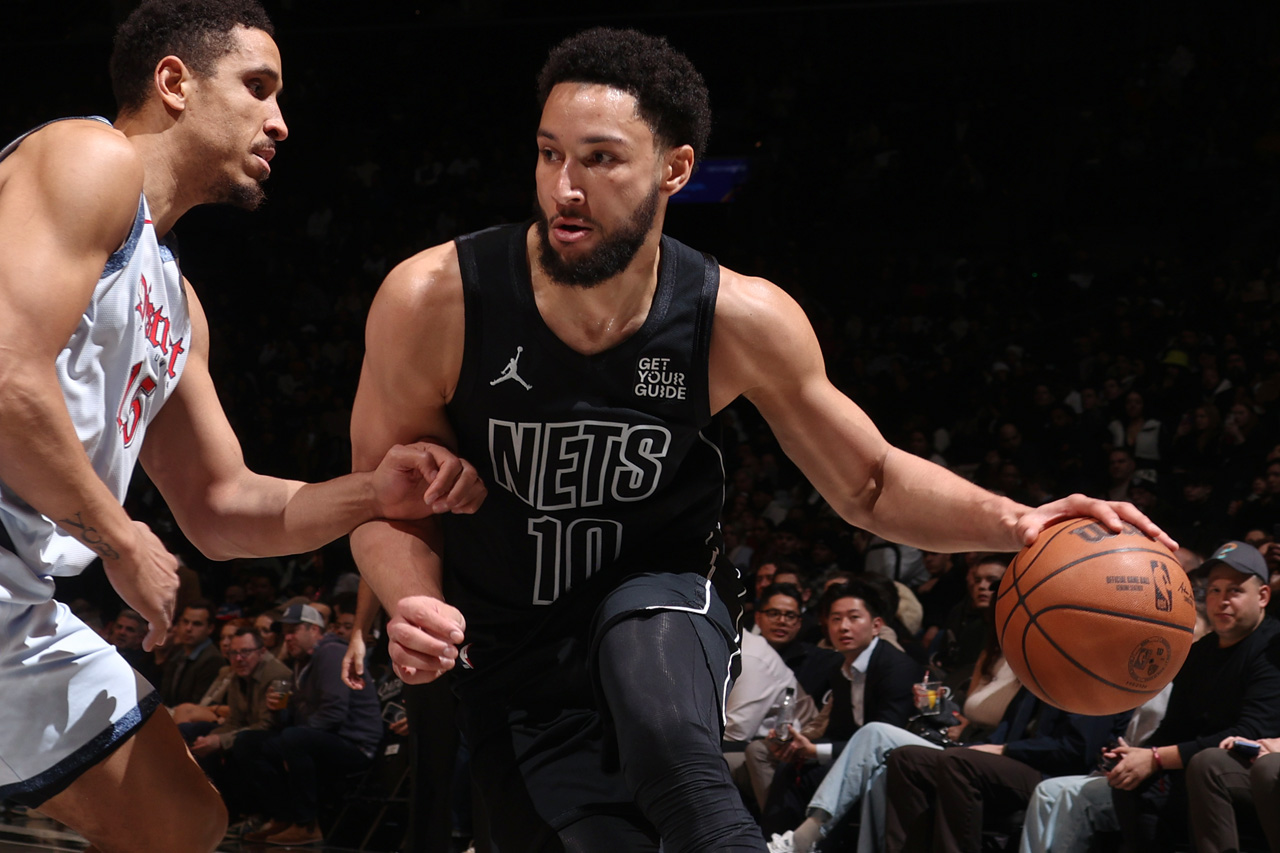
ESPN NBA analyst Brian Windhorst said on Thursday’s NBA Trade Deadline show that Brooklyn Nets forward Ben Simmons is working on a buyout and the Houston Rockets is a potential landing spot for him.
“Cleveland and Houston are two situations for Ben Simmons,” said Windhorst.
Brian Windhorst says the Cavaliers and Rockets are buyout locations for Ben Simmons.
Thoughts? pic.twitter.com/7ly4mvmxr5
— ClutchFans (@clutchfans) February 6, 2025
Advertisement
Rockets coach Ime Udoka was an assistant coach in Philadelphia in 2019-20 when Simmons was with the Sixers, before injuries took a significant toll. In fact, Udoka, when speaking about Amen Thompson earlier this season, brought up some comparisons to Simmons.
“The skill set is there, and it’s something that’s unique with his speed, athleticism, size, passing ability, and all those things,” said Udoka of Thompson. “I coached somebody, Ben Simmons, who had similar traits… as far as size and ability to push the pace, and find guys and finish. There are some similarities there.”
Both Thompson and Simmons are known for their elite athleticism, defensive versatility, and ability to create opportunities in transition.
However, can Simmons help the Rockets today? That’s the tough question.
Simmons has played in 33 games this season, averaging 6.2 points, 6.9 assists, 5.2 rebounds, 0.8 steals and 0.5 blocks in 25 minutes a night. He does not shoot threes (like, at all) — he has only attempted two threes in the past three seasons combined.
Ideally, he does not play in front of your young forwards of Amen, Tari Eason and Jabari Smith Jr. and on that basis alone, I think I would pass. But, Ime loves defensive dogs and he could use some extra ballhandling on the roster. You can see that there’s little in the way of offensive organization when Fred VanVleet is out.
There would be a comical full circle moment though if the Rockets did sign Ben Simmons, considering the Rockets were heavily criticized for trading James Harden in 2021 to Brooklyn instead of to Philadelphia for Simmons. The Rockets clearly made the right choice there.

